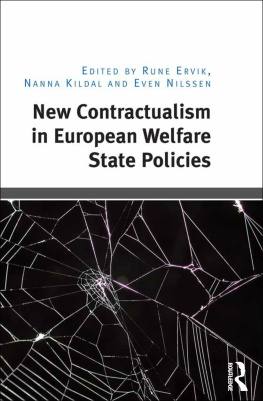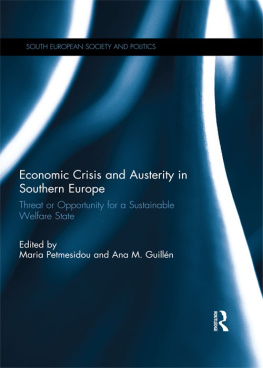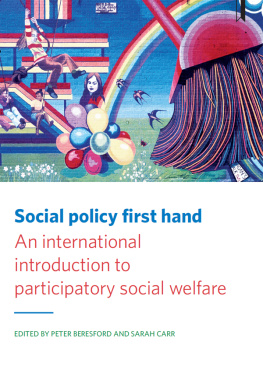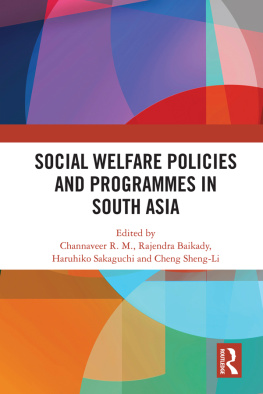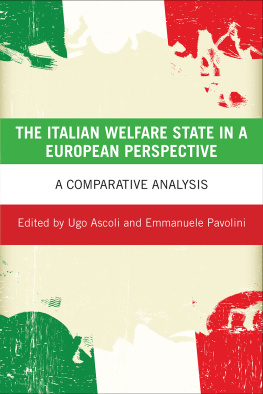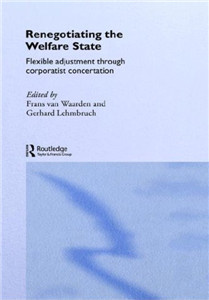NEW CONTRACTUALISM IN EUROPEAN WELFARE STATE POLICIES
New Contractualism in European Welfare State Policies
Edited by
RUNE ERVIK
Uni Research Rokkan Centre, Bergen, Norway
NANNA KILDAL
Uni Research Rokkan Centre, Bergen, Norway
EVEN NILSSEN
Bergen University College and Uni Research Rokkan Centre, Bergen, Norway
First published 2015 by Ashgate Publishing
Published 2016 by Routledge
2 Park Square, Milton Park, Abingdon, Oxon OX14 4RN
711 Third Avenue, New York, NY 10017, USA
Routledge is an imprint of the Taylor & Francis Group, an informa business
Copyright Rune Ervik, Nanna Kildal and Even Nilssen 2015
Rune Ervik, Nanna Kildal and Even Nilssen have asserted their right under the Copyright, Designs and Patents Act, 1988, to be identified as the editors of this work.
All rights reserved. No part of this book may be reprinted or reproduced or utilised in any form or by any electronic, mechanical, or other means, now known or hereafter invented, including photocopying and recording, or in any information storage or retrieval system, without permission in writing from the publishers.
Notice:
Product or corporate names may be trademarks or registered trademarks, and are used only for identification and explanation without intent to infringe.
British Library Cataloguing in Publication Data
A catalogue record for this book is available from the British Library.
The Library of Congress has cataloged the printed edition as follows:
Ervik, Rune.
New contractualism in European welfare state policies / by Rune Ervik, Nanna Kildal, and Even Nilssen.
pages cm
Includes bibliographical references and index.
ISBN 978-1-4724-4505-6 (hardback) -- ISBN 978-1-3155-9791-1 (ebook) -- ISBN 978-1-3170-8859-2 (epub) 1. Welfare state--European Union countries. 2. Public welfare--European Union countries. 3. Social contract. 4. European Union countries--Social policy. I. Title.
HN373.5.E68 2015
320.5130947--dc23
2015008817
ISBN 9781472445056 (hbk)
ISBN 9781315597911 (ebk-PDF)
ISBN 9781317088592 (ebk-ePUB)
Contents
Rune Ervik, Nanna Kildal and Even Nilssen
Simon Birnbaum
Jean-Michel Bonvin and Emilie Rosenstein
Even Nilssen
Rune Ervik and Nanna Kildal
Nanna Kildal and Even Nilssen
Jrn Henrik Petersen
Patrick John Ring
Rune Ervik, Nanna Kildal and Even Nilssen
List of Tables
Note on Contributors
Simon Birnbaum is a Researcher at the Department of Political Science, Stockholm University and the Institute for Futures Studies in Stockholm, Sweden. Most of his research focuses on normative political theory, social justice and the future of the welfare state.
Jean-Michel Bonvin is Professor of Social Policy and Vulnerability at the University of Geneva, Switzerland. His main fields of expertise include labour market policies, social policies, the sociology of firms and theories of justice.
Rune Ervik is a Senior Researcher at Uni Research Rokkan Centre, Bergen, Norway. His research interests include comparative perspectives on pension policies and reform, the politics of ageing, international social policy and the impact of discourse and policy ideas on institutional and normative changes in social policy.
Nanna Kildal is a Senior Researcher at Uni Research Rokkan Centre, Bergen, Norway. Her main research interests relate to comparative welfare state research, international social policy discourses and reforms and normative dimensions of welfare policies.
Even Nilssen is a Professor at Bergen University College and senior researcher at Uni Research Rokkan Centre, Bergen, Norway. His research interests cover comparative studies in the field of welfare and work, the role of international organisations in social policy and the impact of juridification processes on the construction of social citizenship.
Jrn Henrik Petersen is Professor of Social Policy and Welfare History at the University of Southern Denmark, Odense. He is affiliated to the Centre for Welfare State Studies, University of Southern Denmark. His main interest is the history of the welfare state and current problems of the welfare state.
Patrick John Ring is a Senior Lecturer at Glasgow Caledonian University, Scotland. His current academic interests relate particularly to pension policy and reform, the nature of risk in financial services and the position of the consumer in retail financial services.
Emilie Rosenstein is Research Fellow at the University of Geneva. She is a member of the National Centre of Competence in Research LIVES Overcoming Vulnerability: Life Course Perspectives. Her fields of expertise include welfare policies, especially disability policies.
Preface
This book is an outcome of a research project on: The Social Contract as an Organizing and Justifying Principle in Welfare State Policies (20112014), financed by the Norwegian Research Council under its FRISAM programme for independent basic research. The project was conducted at the Uni Research Rokkan Centre in Bergen by senior researchers Rune Ervik, Nanna Kildal and Even Nilssen.
As part of the project we invited leading scholars to submit papers that were subsequently developed into full chapters to appear in the present, edited volume. We extend our compliments to Simon Birnbaum, Jean-Michel Bonvin, Jrn Henrik Petersen, Patrick John Ring, and Emilie Rosenstein for their valuable contributions and for cooperating very smoothly along the way.
Since our first contact with the publisher and throughout the publishing process we have appreciated helpful, sincere and effective cooperation with Ashgate representatives. We thank Rob Sorsby, Senior Commissioning Editor Politics, for initially arranging a review of our book proposal and helping with advice on the ensuing preparation of this work. We also extend our thanks to the three anonymous reviewers for valuable comments.
Finally, we acknowledge the support of the Uni Research Rokkan Centre during the process, and a particular thank you goes to Communications Adviser, Hilde Kjerland for help with the final stage of preparing the manuscript before submission to Ashgate.
Rune Ervik, Nanna Kildal and Even Nilssen,
January 2015,
Bergen
Chapter 1
Introduction
Rune Ervik, Nanna Kildal and Even Nilssen
The so-called Golden Age of the welfare state (194573) was characterised by a strengthening of social rights and processes of de-commodification, in which citizens were increasingly protected against the vagaries of the market through collective provision of income security and social services.
The oil crisis and the combination of inflation and high unemployment marked the end of this period of welfare expansion and voices that were increasingly critical of the welfare state compromise were raised. One line of such critiques, questioned the moral foundation of the welfare state in terms of what they saw as an unbalanced focus on social rights and the demands of citizens, which did not consider the duties of individuals as part of the social contract on which the welfare state rested. Partly as a response to this critique, many Western countries advanced contractual modes of thinking and regulation within the area of welfare policy from the 1980s onwards. It is with this critique and the policy responses to it that our book engages. Contractualism has become a significant organising principle for public reforms in general and for social policy reforms in particular. Within social policy, the idea of a contract has been particularly widespread in employment services but is also found in other policy areas, such as child care, social assistance, education and pension policy.


